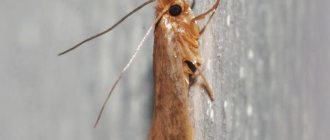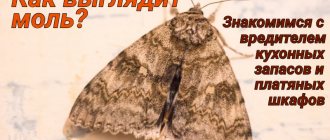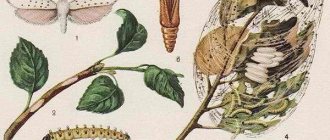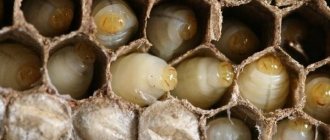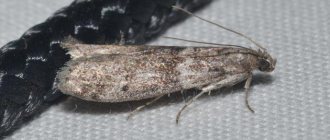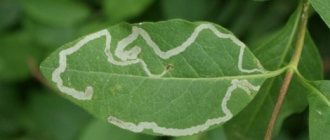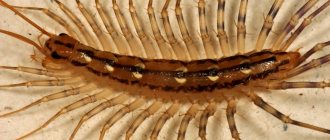The question of how to remove moths from an apartment is asked from time to time by many owners who have encountered this parasite. And this is not surprising, since the appearance of small flying butterflies is directly related to damage to things. At the same time, there are two types of moths and each of them will have its own diet - for some, wool and fur products are preferred, while others parasitize on cotton fabrics.
Habitats and parasitism
First, it’s worth finding out where moths start? This household pest prefers only natural materials, and accordingly, it will parasitize in close proximity to the following:
- firstly, it is a wardrobe, because it is there that luxurious fur coats, hats, woolen coats and other similar wardrobe items are carefully stored;
- secondly, moths may take a liking to the natural upholstery of your new sofa or chair; in this case, you should look for parasites in the folds and seams;
- thirdly, if there is a carpet woven from natural threads on the wall or floor, then the pest can parasitize on it, both from the inside and from the front.
On a note! The clothes moth is a poor flyer, so it is unable to move long distances on its own. Accordingly, you bring it into your home yourself: with new things, pieces of furniture, etc.
How to find moth larvae?
Butterflies are always visible, but it is very difficult to determine the location of the caterpillars, and this is what it is advisable to do first. How to determine the presence of moth larvae? For clothes moths this is:
- Holes in things and clothes.
- Eaten fur (hairs) on a fur coat.
- Larvae skins.
- Cocoons having an oblong shape.
- Live butterflies, caterpillars and their pupae.
- The passages that insects have gnawed into furniture or carpets.
The presence of food moths can be determined by:
- Cobwebs in packaging bags.
- Small gray butterflies flying among the products.
- Lumps of sticky flour or grains.
- Dried skins of larvae.
- Candy or chocolate with eaten moves.
- Rotten in dried fruits or dried mushrooms.
- Clearly visible insects and their larvae.
Furniture moth and clothes moth: what is the difference?
Clothes moths and furniture moths will have their own separate diets - the first feeds on cotton products, the second on fur and wool. In nature, this is what happens, but in an apartment, each of these species can quite easily move from one food to another. Therefore, today these butterflies are collectively called clothes moths.
In fact, these insects have many similar characteristics:
- the body is small in size and length is no more than 9 mm;
- the color is straw-yellow, rather inconspicuous, especially with folded wings;
- Only males can fly, but representatives of both the first and second species do it rather ineptly;
- females of both species do not use wings, although they have the ability to fly; their wings are somewhat smaller in size compared to the wings of males.
Distinctive features can only be noticed upon closer examination - the furniture moth will have a darker color and dark areas at the base of the wings.
Moth larvae as the main pest
However, the greatest damage is caused not by winged insects, but by their larvae. It is the small caterpillars that parasitize in your sweaters, expensive fur coats and carpets; they are the ones who leave behind holes in clothes and furniture upholstery; they are the real household pests.
The growth and development of house moth larvae directly depends on diet and temperature conditions:
- if the food they absorb consists only of natural materials, then the development of the caterpillars will occur quite quickly - in 3 weeks they will have time to molt about 12 times and pupate;
- if the food is rich in synthetic fibers, which are very poorly digested, accordingly, the growth of the larvae will slow down somewhat - this period will take 2 months or even six months;
- As for temperature conditions, when the ambient temperature drops significantly, the rate of growth and development of young animals noticeably decreases, the caterpillars become smaller, and at especially low temperatures they weave cocoons around their body, stop feeding and freeze.
But if your apartment is cozy, warm and there is something to profit from, in particular, products made from natural materials, then moth caterpillars will feel great there. With their mandibles, which is the name of their oral apparatus, presented in the form of two large outgrowths, they deftly trim fabric fibers and wool. Thanks to powerful jaw muscles, the larvae quickly gnaw fairly large areas of matter and direct food into the stomach, from where it enters the intestines.
On a note! Compared to the body, the stomach and intestines of the larvae are enormous in size and can hold quite a large amount of food!
The larvae of clothes moths and furniture moths are somewhat different from each other.
Absolutely all larvae lead a sedentary lifestyle and do not crawl far from the place where they emerge from the egg. Until they turn into a butterfly, they spend almost all their time in one place. But as soon as the larva becomes an adult, it stops feeding and spends the rest of its life, which lasts only a few days, only on reproduction.
Lifestyle
The development period of caterpillars depends on environmental conditions. Clothes moth prefers a temperature of 23-25 degrees. Under these conditions, it will take 3 months to develop. If the temperature rises to 30 degrees, this period will be reduced to 2 months. If the temperature in the apartment is maintained at 13 degrees, the caterpillar will be forced to eke out its existence for as long as 6 months and 10 days.
If the temperature drops below 13 or exceeds 30, the caterpillars will die.
On a note!
The movement of the pest between human dwellings occurs with the help of humans. Most likely, it is the caterpillars that are carried, since butterflies are practically incapable of flying. The larvae are brought into the house with clothes, carpets, and food.
Fighting methods
How to destroy moths in an apartment? For this purpose, you can use the following methods and means:
- heat treatment;
- chemicals;
- folk remedies.
Let's look at each of them in more detail.
Heat treatment
As is known, these insects are able to exist in a certain temperature range, which is -5°C ... +45°C. And if the thermometer scale crosses one of these, the moth is guaranteed to die. What can be done?
- If parasites have settled in your apartment during the cold season, then you can simply open the windows and freeze out all the pests in just a few hours. In this case, both adult butterflies and larvae are guaranteed to die.
Important! Don't forget that low temperatures can not only kill moths, but also damage the heating system! Therefore, the batteries must be protected first!
- Another method is to wash contaminated items at the maximum permissible temperature in automatic mode. But it is clear that this method is only suitable for clothing; furniture and carpets should be processed using industrial units.
- If moths have infested fur products, there are special refrigeration chambers for them.
On a note! It is useless to destroy only flying butterflies mechanically, that is, using a rolled-up newspaper or a slipper, since the main pest will remain in the clothes and continue to spoil them!
Chemicals
The best results in the fight against body parasites come from using insecticidal preparations specially created for this purpose. They are available in several types: aerosols, fumigators and repellent sections.
Aerosol
Anti-moth aerosol is the most convenient chemical preparation that is quite effective. With its help you can destroy both butterflies and small larvae. Each aerosol is based on a powerful toxic substance, but does not leave behind any unpleasant odor. Moreover, most of these products contain aromatic fragrances.
Using aerosol insecticides is very simple: spray the product on clothing, the inside of cabinets, carpets and upholstery. Modern preparations can rid your home of parasites in a short period of time and at the same time will be completely safe for fabrics - they will not leave any stains or unpleasant odors.
Important! It should be remembered that an aerosol cloud consists of tiny particles that can quickly and easily penetrate the respiratory tract. A high concentration of toxic substances often causes severe poisoning. Therefore, before using this or that anti-moth aerosol, you should carefully study the instructions and do not forget about personal protective equipment!
Among the aerosols against moths, the most popular are: “Moskitol”, “Armol”, “Antimol”, “Dezmol”, “Foxide”.
Fumigators
Fumigators are also quite effective in combating moths. There are two types of fumigators on sale: electric and pyrotechnic. The principle of their operation is largely similar - the first begin to emit toxic substances after the electrical plates are heated, the second emit toxic smoke after the spiral is set on fire.
The most popular moth fumigators today are: “Moskitol”, “Raid” and “Raptor”. In fact, they are designed to kill mosquitoes, but, as the manufacturer assures and practice shows, they are quite effective against moths. These devices are safe for human and pet health and do not leave any odor after use.
On a note! You can find two types of electric fumigators on sale: the first ones work on plates that need to be changed every time they are turned on, the second ones have a reservoir with liquid and this device lasts for a longer period!
Sections
Sections are the most primitive and at the same time simplest way to get rid of moths. These devices are small plates impregnated with a special substance that repels pests. The sections should simply be hung in a closed cabinet or placed on shelves. After some time the moth will disappear.
On sale today you can find a huge number of sections against moths. They have different shapes and aroma, which allows the consumer to choose a model to suit their taste. The sections “Raid”, “Raptor”, “Antimol”, “Gardex” and “Moskitol” are popular today.
DR plates KLAUS
Plates for killing moth larvae without odor Country: Russia Average price: 59 rub. Rating (2020): 4.8
Unlike most similar products, the plates do not repel moths, but destroy their larvae, since the composition includes the insecticide transfluthrin. Its content is low, so the drug is safe for humans. In reviews, buyers mention another advantage - the plates do not smell of anything, which means that the clothes will not have any foreign odors.
The principle of use is extremely simple - the product is laid out in closets and, if necessary, placed directly in the pockets of clothes, hats, and winter shoes for local protection against insects. The action is quite long - up to six months. The effectiveness of the product is not in doubt, since there are a lot of positive reviews about it.
Folk remedies
And finally, you should find out how to remove moths using traditional methods. All the tools and techniques that will be described below do not involve the use of any chemicals, are available to everyone and are inexpensive. However, at the same time, it is quite problematic to destroy moths with their help; they are intended rather to repel insects. For this reason, to achieve a positive result, they should be used to combat parasites in combination with more powerful modern drugs.
- Essential oils. For moths, the smells of essential oils such as orange, geranium and lavender are repulsive. They need to soak cotton pads and place them in places where moths accumulate.
- Repellent plants. Dried geranium or lavender herbs are tied in bunches and hung in the closet.
- You can use scented toilet soap as a deterrent.
- Newspaper helps against moths. They wrap or rearrange things in it and leave them in the closet. However, this method is not suitable for light fabrics and fur products.
As you know, taking preventative measures is always easier than fighting moths afterwards. Therefore, do not forget to regularly ventilate your closet, clean fur and woolen items, and shake out items on shelves and hangers from time to time.
Prevention measures
Moths in the apartment - what to do? In order to ask this question less often or forget about the pest forever, you must follow a number of rules that will help protect your home from the invasion of this voracious insect.
- When purchasing items, you need to carefully inspect them, especially the seams, pockets, and lining. This is especially true for items made of fur and wool.
- It is advisable to hang all new clothes in frosty or sunny weather for several hours on the balcony or outside.
- Store bulk products in containers with lids. Inspect them carefully before putting them in the closet. Do not try to buy for future use, because with long-term storage, the likelihood that moths will appear in cereals or flour increases.
- Periodically, you need to go through all the things in the wardrobe and wipe the shelves with soapy water.
- Use folk remedies as prevention. Place orange peels in cabinets, or place bottles of perfume that have run out.
- Ventilate the room regularly and use air fresheners.
Lure Delicia Mottenschutz
An effective and economical product Country: Germany Average price: 203 rubles. Rating (2020): 4.6
This product consists of sheets of paper impregnated with a special composition, which, when evaporated, repels moths and leads to the death of their larvae. To avoid premature weathering, the sheets are packaged in protective film. One package contains two strips, each of which is divided into 10 parts.
The principle of use is no different from other drugs - the moth repellent is placed in cabinets, under carpets, and in dresser drawers. The effect is long-lasting – up to four months. According to user reviews, this German anti-moth drug is indeed very effective. Many people like the complete absence of odor. But it has a significant drawback - it is not sold in all stores.
